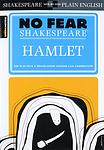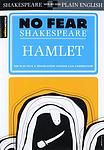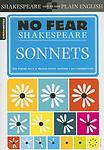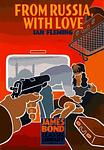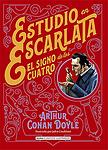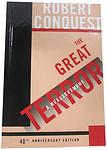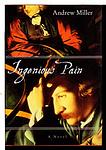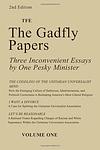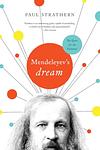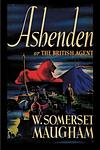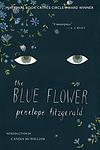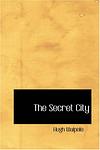The Greatest British "Russia" Books of All Time
Click to learn how this list is calculated.
This list represents a comprehensive and trusted collection of the greatest books. Developed through a specialized algorithm, it brings together 300 'best of' book lists to form a definitive guide to the world's most acclaimed books. For those interested in how these books are chosen, additional details can be found on the rankings page.
Genres
The category of "Russia" in books typically encompasses literature that explores the history, culture, politics, and society of Russia. This can include works of fiction, non-fiction, memoirs, and biographies that delve into the complexities of Russian life, from the tsars and the Soviet era to contemporary Russia. These books may also examine the country's relationship with other nations, its artistic and literary traditions, and its impact on global events. Overall, the category of "Russia" offers a rich and diverse range of books that provide insight into one of the world's most fascinating and complex nations.
Countries
Date Range
Reading Statistics
Click the button below to see how many of these books you've read!
Download
If you're interested in downloading this list as a CSV file for use in a spreadsheet application, you can easily do so by clicking the button below. Please note that to ensure a manageable file size and faster download, the CSV will include details for only the first 500 books.
Download-
1. Hamlet by William Shakespeare
This classic play revolves around the young Prince of Denmark who is thrown into a state of emotional turmoil after his father's sudden death and his mother's quick remarriage to his uncle. The prince is visited by the ghost of his father who reveals that he was murdered by the uncle, prompting the prince to seek revenge. The narrative explores themes of madness, revenge, and moral corruption as the prince navigates the complex political and emotional landscape of the Danish court.
-
2. First Folio by William Shakespeare
This collection is a compilation of 36 plays by a renowned English playwright, published seven years after his death. It includes comedies, histories, and tragedies, some of which had never been published before. Notable works in the compilation include "Macbeth," "Julius Caesar," "Twelfth Night," "The Tempest," and "As You Like It." The collection is considered one of the most influential books ever published in the English language, as it preserved many of the playwright's works that might have otherwise been lost.
-
3. Nights At The Circus by Angela Carter
"Nights at the Circus" is a fantastical tale set in the late 19th century, centering around a trapeze artist who claims to be a swan princess with wings. A journalist is intrigued by her story and joins the circus to uncover the truth. As the troupe travels from London to Siberia, the journalist becomes increasingly enchanted by the strange world of circus performers and his relationship with the trapeze artist deepens. The book explores themes of love, freedom, and the blurred lines between reality and illusion.
-
4. The Sonnets by William Shakespeare
"The Sonnets" is a collection of 154 poems that explore themes such as love, beauty, politics, and mortality. The sonnets are written in a specific form that the poet popularized, consisting of 14 lines with a specific rhyme scheme. The collection is divided into two sections: the first 126 sonnets are addressed to a young man, while the last 28 are addressed to a woman known as the 'dark lady'. This collection is widely considered one of the greatest achievements in English literature.
-
5. The Passion by Jeanette Winterson
"The Passion" is a historical novel set during the Napoleonic Wars and told from the perspectives of two unique characters: a French soldier who serves in Napoleon’s army and a Venetian woman with webbed feet who works as a casino worker. The narrative explores themes of love, passion, identity, and fate as the two characters' lives intertwine in unexpected ways. The book is renowned for its magical realism and lyrical prose, offering a poetic exploration of human desire and the nature of love.
-
6. From Russia with Love by Ian Fleming
In this thrilling spy novel, British secret agent James Bond is targeted by a Russian intelligence group, who lures him into a trap using a beautiful cipher clerk as bait. The plot thickens as Bond falls for the clerk and must navigate a series of dangerous encounters with Russian operatives, including a deadly face-off with a sadistic killer. The story is a blend of action, suspense, and romance, set against the backdrop of the Cold War.
-
7. Under Western Eyes by Joseph Conrad
Set in St. Petersburg and Geneva, the novel follows a young Russian student named Razumov who becomes embroiled in revolutionary politics after unwittingly helping a fellow student who has assassinated a high-ranking official. Struggling with his own beliefs and loyalties, Razumov is sent to Geneva as a spy, where he becomes entangled with the exiled revolutionaries, including a woman named Haldin. The novel explores themes of identity, betrayal, and the ideological divide between East and West.
-
8. A Study In Scarlet by Arthur Conan Doyle
"A Study in Scarlet" is a gripping detective novel that introduces the brilliant detective Sherlock Holmes and his loyal companion Dr. John Watson. When a mysterious murder takes place in London, Holmes and Watson are called upon to solve the case. As they delve deeper into the investigation, they uncover a complex web of revenge, love, and betrayal that spans across continents and decades. With Holmes' unparalleled deductive skills and Watson's steadfast support, the duo unravels the truth behind the murder and brings the culprits to justice. This thrilling tale not only showcases Holmes' extraordinary abilities but also explores the unique bond between the detective and his trusted friend.
-
9. The Great Terror by Robert Conquest
"The Great Terror" is a comprehensive analysis of Joseph Stalin's purges in the Soviet Union during the 1930s. The book delves into the brutal and systematic elimination of potential political rivals, intellectuals, and ordinary citizens, who were falsely accused of espionage, sabotage, or being counter-revolutionary. It provides a detailed account of the show trials, executions, and forced labor camps, shedding light on one of the darkest periods in Soviet history.
-
10. Chronicles of Wasted Time by Malcolm Muggeridge
"Chronicles of Wasted Time" is an autobiography that explores the life and thoughts of a British journalist and satirist during the 20th century. The book provides a critical perspective on the political and social changes of the time, including the author's experiences in India, Russia, and during World War II. The author also delves into his personal journey from agnosticism to Christianity, offering a profound reflection on faith and spirituality.
-
11. Ingenious Pain by Andrew Miller
The book explores the life of James Dyer, a man born in 18th century England with a peculiar condition - he cannot feel physical pain. Despite this, Dyer's life is far from painless as he navigates through various experiences, from working as a sideshow attraction to becoming a surgeon. As he encounters love, loss, and the complexities of human existence, Dyer's inability to feel pain becomes both a blessing and a curse, leading him on a journey of self-discovery and ultimately questioning the true nature of pain and its role in shaping our lives.
-
12. The Ringed Castle by Dorothy Dunnett
This novel transports readers to the heart of the 16th century, weaving a tale of intrigue, power, and romance through the journey of its protagonist, a Scottish nobleman who finds himself in the vast expanses of Tsarist Russia. Tasked with the monumental challenge of modernizing the Russian military and navigating the treacherous waters of court politics, he must also contend with his complex personal life, marked by a tumultuous love affair. Set against the backdrop of historical events and real historical figures, the narrative masterfully blends factual accuracy with fiction, offering a vivid portrayal of the era's political and cultural landscapes. This installment of a larger series captivates with its rich historical detail, complex character development, and a plot that seamlessly marries the personal with the political.
-
13. The Origins Of Totalitarian Democracy by J. L. Talmon
The book explores the historical development of the concept of totalitarian democracy, a political system that combines an official ideology with an authoritarian regime, claiming to represent the will of the people. It delves into the paradoxical nature of this form of government, which seeks to achieve a utopian ideal of democracy through undemocratic means. The author traces the roots of this phenomenon back to the Enlightenment and the French Revolution, examining the ideological underpinnings and the evolution of political thought that led to the emergence of totalitarian regimes in the 20th century. The work is a critical analysis of how revolutionary movements can devolve into oppressive systems that justify their actions in the name of democracy and the public good.
-
14. The Gadfly by Ethel Lilian Voynich
The novel centers around a young British man who, disillusioned by the corruption and moral hypocrisy he witnesses within the Catholic Church, becomes a radical revolutionary in 19th-century Italy. As he engages in the struggle for Italian unification and independence from Austrian domination, he adopts the moniker "The Gadfly" and becomes notorious for his incisive and biting critiques against the establishment. His personal quest for justice and freedom is complicated by a tangled web of relationships, betrayals, and a haunting secret from his past that profoundly impacts his life and the lives of those around him. The story is a blend of adventure, political intrigue, and personal turmoil, set against the backdrop of historical events.
-
15. Mendeleyev's Dream by Paul Strathern
This book traces the history of chemistry from the ancient philosophers' wild speculations about the composition of the universe to the creation of the periodic table by Dmitri Mendeleyev. Through a blend of storytelling and science, it explores the development of atomic theory and chemical elements, leading up to Mendeleyev's groundbreaking dream in which he envisioned the periodic table in its modern form. The narrative delves into the lives and discoveries of key figures in the field of chemistry, illustrating how their work contributed to our understanding of the elements that make up the world around us.
-
16. Russian Thinkers by Isaiah Berlin
The book is a collection of essays exploring the ideas of key 19th-century Russian intellectuals who shaped the social, political, and cultural contours of their time. It delves into the works and impact of thinkers such as Alexander Herzen, Ivan Turgenev, and Leo Tolstoy, examining their contributions to debates on Russian identity, the role of the intelligentsia, and the future of their nation. The author critically analyzes the ideological conflicts between Westernizers and Slavophiles and the struggle to reconcile Western European liberal thought with uniquely Russian conditions, offering insights into the philosophical underpinnings of Russia's historical trajectory.
-
17. The Polygots by William Gerhardie
This novel is a satirical and semi-autobiographical work that delves into the life of its protagonist, George Hamlet Alexander Diabologh, amidst the backdrop of the chaotic aftermath of World War I and the Russian Revolution. Set across various locations in Asia and Europe, the narrative explores the eccentricities and follies of a wide array of characters, ranging from military officers to expatriates, each depicted with a blend of humor and poignancy. The protagonist's journey through these tumultuous times and his interactions with the diverse cast of characters serve as a vehicle for the author's exploration of themes such as cultural dislocation, the absurdity of human nature, and the search for meaning in a post-war world.
-
18. Ashenden, Or, The British Agent by W. Somerset Maugham
The book is a collection of loosely connected stories based on the author's own experiences as a member of British Intelligence during World War I. It follows the protagonist, a writer turned spy named Ashenden, as he undertakes various espionage tasks across Europe and Russia. Through a series of character-driven vignettes, the narrative delves into the morally ambiguous world of espionage, exploring themes of loyalty, deceit, and the human cost of intelligence work. The protagonist's interactions with a diverse cast of characters, from fellow spies to enemy agents, reveal the complexities and psychological nuances of the shadowy world of wartime espionage.
-
19. The Reason Why by Cecil Woodham-Smith
"The Reason Why" is a historical narrative that explores the circumstances leading to the infamous Charge of the Light Brigade during the Crimean War. The book delves into the lives and personalities of key figures involved, including Lord Cardigan and Lord Lucan, highlighting their personal rivalries, political machinations, and the miscommunications that led to the disastrous military action. The narrative is meticulously researched and provides a detailed account of the event, shedding light on the complexities of British military bureaucracy and the tragic consequences of poor leadership.
-
20. Kolymsky Heights by Lionel Davidson
The novel is a gripping espionage thriller set in the frigid, remote reaches of Siberia, where a secret scientific research facility, hidden deep within the vast and treacherous Kolyma region, draws the interest of Western intelligence. The protagonist, a brilliant and linguistically gifted Englishman, is recruited for an almost impossible mission: to infiltrate the top-secret installation, Kolymsky Heights, and uncover its mysteries. Disguised as a native Siberian truck driver, he embarks on a perilous journey through the icy wilderness, facing extreme weather, treacherous terrain, and the ever-present risk of discovery by Soviet authorities. His quest for knowledge becomes a harrowing adventure of survival and espionage, as he delves into the enigmatic purpose of the facility and attempts to relay its secrets to the outside world.
-
21. In Siberia by Colin Thubron
"In Siberia" is a travelogue that takes the reader on a profound journey through the vast and enigmatic Siberian landscape. The author traverses the region, from the Ural Mountains to the Arctic coast, exploring its desolate beauty and the resilience of its inhabitants amidst harsh climates and historical upheavals. Along the way, he encounters remnants of the Soviet era, indigenous cultures clinging to their traditions, and the poignant traces of exile and punishment that have marked the land. The narrative is a rich tapestry of history, personal encounters, and vivid descriptions that capture the soul of a place often synonymous with remoteness and exile.
-
22. Midnight In Chernobyl by Adam Higginbotham
"Midnight In Chernobyl" is a non-fiction book that tells the story of the 1986 Chernobyl nuclear disaster. The book provides a detailed account of the events leading up to the explosion, the immediate aftermath, and the long-term effects of the disaster. It also explores the political and social context of Soviet Ukraine at the time, and the impact that the disaster had on the country and the world. The book draws on interviews with survivors, officials, and experts, as well as archival documents and scientific research, to provide a comprehensive and compelling narrative of one of the worst nuclear accidents in history.
-
23. Offshore by Penelope Fitzgerald
"Offshore" is a novel that revolves around a group of eccentrics who live on houseboats on the Thames River in London. The story is set in the 1960s and focuses on the daily lives and struggles of these unconventional characters, including a divorced mother of two, a marine painter, a male prostitute, and a retired navy man. The narrative explores themes of community, isolation, and the struggle to maintain a sense of stability in a constantly changing environment.
-
24. The Beginning of Spring by Penelope Fitzgerald
Set in Moscow in 1913, the book follows the life of an English printer named Frank Reid whose wife has abruptly left him and their three children. As Frank tries to maintain his printing business and look after his children in the midst of the impending Russian Revolution, he also attempts to understand why his wife left and if she will ever return. The novel is a blend of historical fiction and family drama, exploring themes of change, uncertainty, and cultural differences.
-
25. The Secret City by Hugh Walpole
"The Secret City" is a gripping tale set in a small English town, where the lives of its inhabitants are forever changed by the arrival of a mysterious stranger. As secrets unravel and dark pasts resurface, the townspeople find themselves caught in a web of intrigue, betrayal, and forbidden love. With its atmospheric setting and complex characters, this novel explores the hidden depths of human nature and the consequences of keeping secrets.
Reading Statistics
Click the button below to see how many of these books you've read!
Download
If you're interested in downloading this list as a CSV file for use in a spreadsheet application, you can easily do so by clicking the button below. Please note that to ensure a manageable file size and faster download, the CSV will include details for only the first 500 books.
Download